Since the influx of Ethiopian refugees into Sudan began in November 2020 following military unrest in the Tigray region, most humanitarian assistance has been focused on food, shelter, and primary health services. In response to this, the Sudan Family Planning Association (SFPA) established two clinics in Um Rakouba and Tunaydbah refugee camps to meet the needs of sexual and reproductive health (SRH) services. This includes comprehensive care of HIV/AIDS, allowing people living with HIV (PLHIV) to continue antiretroviral therapy (ARV) with privacy and confidentiality. Their services also involve the prevention and syndromic management of other sexually transmitted infections.
The current emergency situation in Sudan has led to an estimated displacement of 7.6 million people across Sudan's 18 states, with over 13,000 reported deaths. This crisis is causing serious challenges to the already stretched health system. The increase of internally displaced people (IDPs) during the last nine months has also affected the provision of health services for the general population.
The Government of Sudan, with the assistance of national and international partners, is going to huge efforts to ensure health coverage for IDPs and refugees. However, among the current national plans and funding, healthcare for HIV positive refugees is not adequately addressed. SFPA is also facing challenges providing SRH care, especially in the refugee camps, as they struggle to keep up with the numbers of IDPs - which are increasing dramatically by the day.
SFPA provides SRH services in collaboration with the Sudan National AIDS Control Program (SNAP) and Al Gadarif SMOH. The total number of refugees living with HIV has now reached a tipping point, with 758 current cases recorded so far. So far, all clients have been able to regularly receive their ARV treatment. Many of them have reached zero viral load due to good adherence to treatment, meaning that the levels of HIV in the body are so low that the virus cannot be passed on.
However, due to a shortfall of funding and resources, the risk of the discontinuation or interruption of ARVs may result in viral rebound, immune decompensation, and the progression of the virus. The higher percentage of newly discovered cases (10.4% of newly arrived refugees tested positive to HIV) also indicates that there is a new spread of HIV, not only amongst the youth population inside the camps, but also host communities.
Given the current condition of refugee camps in Al Gadarif State, failure to adequately provide for people living with HIV/AIDS and prevent further transmissions may lead to catastrophic outcomes - not only in the camps but nationwide.
About the Sudan Family Planning Association (SFPA)
SFPA is a key SRH service provider in Sudan through its 15 branches covering 14 states1with a solid track record of delivering services in humanitarian settings. SFPA continues to fulfil its mandate and commitment to provide essential SRH and non- SRH services to refugees through an Australia Aid-supported emergency response to Ethiopian refugee crisis from 2021-2022 and continued with support from the Women’s Refugee Commission (WRC) until 31 December 2023, providing health services including testing, counselling, prevention of mother to child transmission, care and treatment services and ensure the enrolment of PLHIV in the ARVs regimen.
Banner credits: IPPF/Hannah Maule-ffinch/Sudan
when
country
Sudan
region
Arab World
Related Member Association
Sudan Family Planning Association








